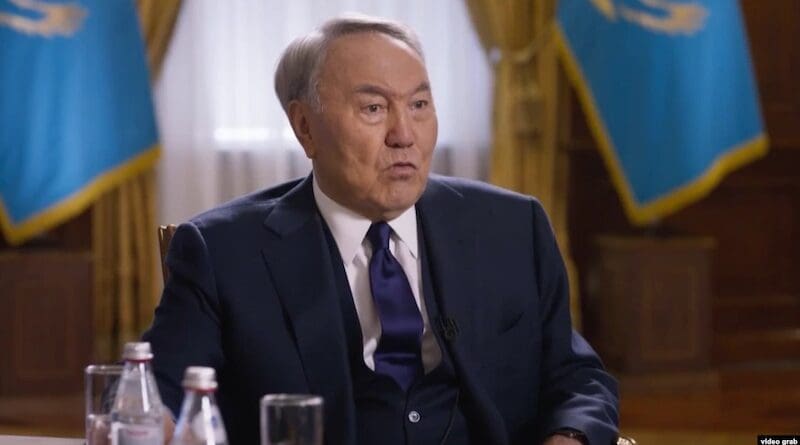Nazarbaev Paid $5 Million For Controversial Oliver Stone Miniseries To Whitewash Image
By RFE RL
(RFE/RL) — A foundation controlled by former Kazakh President Nursultan Nazarbaev paid at least $5 million for a 2021 documentary that sought to whitewash the authoritarian leader’s image, an independent investigation has revealed.
Qazaq: History Of The Golden Man, a documentary produced by pro-Kremlin U.S. filmmaker Igor Lopatonok, centers around a lengthy interview with the long-serving Nazarbaev done by famous yet controversial U.S. film director Oliver Stone, who also made documentaries about Russian President Vladimir Putin, Cuban leader Fidel Castro, and Venezuelan strongman Hugo Chavez.
Nazarbaev, who ruled Kazakhstan with an iron fist for 30 years, speaks about his childhood, political career, the collapse of the Soviet Union, and Kazakhstan’s formation as an independent state.
The documentary was criticized by many film experts and dubbed by one a “hagiographic ode” that became part of Nazarbaev’s “ongoing cult of personality.”
The documentary was released in 2021 both as an eight-part miniseries and feature film. It had been in the works since late 2019 — after Nazarbaev had stepped down from the presidency, though he continued to enjoy enormous political clout in Kazakhstan.
According to an investigation by the Organized Crime and Corruption Reporting Project (OCCRP), a global network of investigative journalists, and the Kazakh-based media site Vlast.kz that was released on March 5 (From Nazarbaev To Lukashenka: Hollywood In The Service Of Dictators), Nazarbaev was personally involved in the making of the film.
“Nazarbaev would constantly edit the film, trying to improve [the depiction of] his image,” a member of the film crew told OCCRP.
Nazarbaev was reportedly satisfied with the final cut of the film, the investigators said.
The Nazarbaev Fund — a charity foundation established when Nazarbaev was in power in 2010 and chaired by daughter Darigha Nazarbaeva — paid at least $5 million to Lopatonok and Stone, according to the investigation.
Lopatonok and Stone had previously denied any Kazakh government involvement in the project.
Neither Nazarbaev nor his daughter responded to the investigators’ request for comment.
Lopatonok agreed to speak to OCCRP and Vlast, but he became increasingly angry during the video interview last month when quizzed by the journalists about the financing of his films. “We’re going after you, personally. We know you. We’re going after your sources,” Lopatonok threatened them. “We’re going to destroy you, your credibility.”
In 2021, Lopatonok refused to respond to an RFE/RL correspondent’s question about the financing of the Nazarbaev documentary, saying he would have no comment because RFE/RL was a “foreign agent.”
Russia’s so-called “foreign agents” law is used to label and punish government critics who receive money from abroad.
The Kazakh ‘Template’
The documentary about Nazarbaev was shown on Kazakh state television just once, in December 2021.
The next month, the oil-rich Central Asian country saw bloody nationwide unrest, with tens of thousands of people taking to the streets to protest former President Nazarbaev and what they saw as his legacy of social injustice, economic inequality, corruption, and a cult of personality.
Authorities say at least 238 people were killed when those demonstrations turned violent, with most of the protesters killed by state security services. The people’s economic grievances were a key factor behind the protests, which started with a peaceful protest about a fuel price hike.
But many Kazakhs believe that a power struggle between the inner circles of Nazarbaev and his handpicked successor, President Qasym-Zhomart Toqaev, played a major role in stirring up the violence.
Following the protests, Toqaev’s government sidelined Nazarbaev, his family, and his cronies from politics and business. Several of Nazarbaev’s relatives and allies are now in prison.
Lopatonok and his team have since pitched similar films to other authoritarian leaders, including Azerbaijan’s Ilham Aliyev and Belarus’s Alyaksandr Lukashenka, the investigation revealed.
“The Kazakh film may have given Lopatonok a template for how to approach other dictators: They or people close to them would provide the funding, and he’d deliver a hagiography with high production value and a star interviewer [Stone] to boot,” the journalists wrote.
The documents obtained by the investigators show that among the topics proposed for Stone’s interview was Azerbaijan’s “success” under the “dynastic rule” of the Aliyev family.
Aliyev, who came to power in 2003 by taking over the presidency from his late father, has been widely criticized for clamping down on his opponents, severely restricting civil liberties, and exploiting political power to enrich his own family. His wife serves as vice president.
In his pitch to Aliyev, Lopatonok wrote that the planned film would “have a unique positive impact on [the] publicity of [the] president and Azerbaijan.” He added that the film about Aliyev would cost $15 million to produce. It’s not known if Aliyev has responded to the proposals.
But Lopatonok’s documentary about Lukashenka had already begun filming at locations across Belarus, including Lukashenka’s childhood home. Lukashenka was to be interviewed in each location. But the work was halted after Russia invaded Ukraine.
Lopatonok, 56, was born in eastern Ukraine. He emigrated to the United States in 2008, where he started Grading Dimension Picture, a little-known Hollywood entity. Since acquiring U.S. citizenship, Lopatonok has often expressed staunchly pro-Kremlin views.
It’s not clear how Lopatonok first encountered Stone, but they worked together on two films about Ukraine: Ukraine On Fire in 2016, followed by Revealing Ukraine in 2019.
The documentaries give a Moscow-friendly view of Ukraine’s 2014 Euromaidan revolution that culminated in the ousting of pro-Russian President Viktor Yanukovych.
The 77-year-old Stone, a four-time Academy Award winner, has had his own share of controversies, including his 2017 work The Putin Interviews, which was describedby The New York Times as “obsequious” and “embarrassingly generous” to the Russian leader.
Stone’s close friendship and support for the controversial Venezuelan leader Chavez was also criticized.

